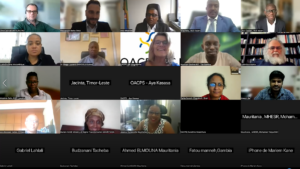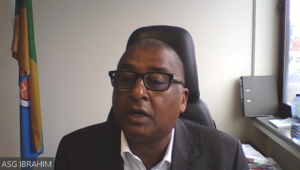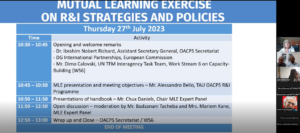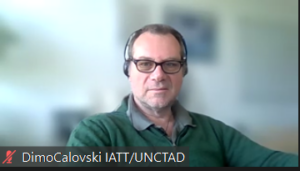32 participants –representing over a dozen country beneficiaries, the Organisation of African, Caribbean and Pacific States (OACPS), the European Union, the UN Interagency Task Team on Science, Technology and Innovation for SDGs Workstream 6 on Capacity Building (UN IATT WS6), the Indian Ocean Commission-, gathered online on 27 July 2023 to share their knowledge and feedback on a draft handbook, in order to enrich it further and make it a practical tool for developing and implementing Research and Innovation policies and strategies.
This meeting represents a key milestone of the journey initiated last February 2023 in Addis Ababa during the first Knowledge exchange meeting and Capacity-building event, co-organised with the UN IATT WS6. This mutual learning exercise is unique in the sense that it leverages on many shareable good practices and experiences from OACPS member countries.
Arising from 5 months of intense work conducted by the Expert Panel and, to compile and analyse all information and inputs shared during the first MLE meeting, and complete it by desktop research, benchmarking and other relevant interviews, a first draft handbook was elaborated, shared and presented to the participants by Dr Chux Daniels, Chair of the Expert Panel, to collect their feedback, and suggestions for improvement.


Kicking off the meeting, Dr. Ibrahim Nobert Richard, Assistant Secretary General of the OACPS Secretariat, reminded the importance of this meeting: “Dear participants, your valuable inputs and perspectives are of utmost importance as they will play a crucial role in fine-tuning and enhancing the overall quality of the document. By actively participating in the discussion, you will contribute significantly to shaping a robust and actionable tool that will aid all policy-makers in effectively developing and implementing research and innovation policies and strategies.”

(Dr. Ibrahim Nobert Richard)
Echoing these remarks, Mrs. Simona Mari, Senior Expert in Research and Innovation at the European Commission DG INTPA, emphasised the necessity to provide a sort of guidance in a practical way, not only on how to develop a policy but also on how to implement it over a long-term period: “How best a country, that maybe does not really have in place a policy or a strategy, should start from and what to do. How to prioritise, because it involves higher education and technical skills, but also of course research, laboratories, technology transfer offices and linkages with the private sector. How to find step by step the requested budgets to implement all the reforms. How to really plan its own resources in a phased way.”

Mr Dimo Calovski, co-chair of the UN IATT WS6, underlined three points in his intervention: “First, the idea of collaborative learning is very important in this relatively young policy domain, because the level of confidence in the policymaking and implementation is not as high as in other domains(…) So building confidence through cooperation is a fantastic idea. My second point is on policy learning. Hands-on experience through mutual learning is extremely valuable, (…) especially when it is based on 15 different experiences, learning mutually from peers and policymakers, this goes to a completely different level. (…) Third point, I think that too much emphasis has been placed on learning and training for technology. It is not to undermine this, but sometimes this does crowd out learning and training for policy design implementation and overall governance. So creating a supportive policy environment for STI is extremely important.”

Discussions were fruitful and provided good input that will be enriched with other written input by mid-August. Another round of consolidation will take place in September and the final version of the handbook will be shared at the MLE final event, which should take place during the last week of September.
Officially launched in February 2023, this is the eighth service of the Policy Support Facility (after Lesotho, Mauritania, The Gambia, Timor-Leste, Kenya, Cameroon and Guinea), implemented by the EU-funded OACPS Research and Innovation Programme, to enhance the quality and efficiency of R&I policy systems.
More information on this MLE service
